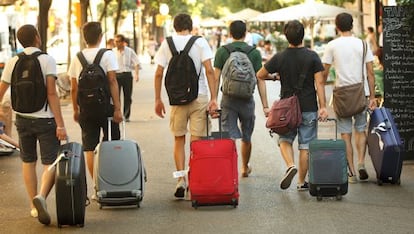Catalonia fines Airbnb €30,000 for offering illegal tourist home rentals
Barcelona is one of the top destinations for users of the US-based lodging hire service


The Catalan government has slapped the US-based website Airbnb with a €30,000 fine for illegally commercializing short-stay apartment rentals that are not listed on the Catalan Tourism Register.
The service puts tourists and private homeowners in touch and advertises unique kinds of accommodation – ranging from city studios, to caves and castles – for stays that can be as short as one night.
Sources in the Catalan government noted that this practice is not allowed under regional legislation, which seeks to protect the hotel industry from what is viewed as unfair competition. If Airbnb does not pull the ads, the Catalan government may initiate proceedings to prevent online access to the site from the entire Catalan territory.
The Catalan government may prevent online access to the site from the entire Catalan territory
Founded in 2008 in San Francisco, Airbnb has become the world’s most popular site for vacation accommodation. It has listings in more than 34,000 cities in 190 countries, and around 15 million people have used its services.
Airbnb has already been targeted by authorities in New York, Quebec and Amsterdam. But Catalonia is the first European region to actually fine the company, which this newspaper has been unable to reach for comment.
The last state legislative reform established that short-term tourist rentals should be regulated by regional governments, and Catalonia was the first to make a move after it counted an estimated one million illegal beds in its territory. Since its own laws went into effect, many owners have signed up on the register and have committed to complying with safety and hygiene requirements in their tourist rental homes. But renting out individual rooms continues to be prohibited in any case, a fact that influenced the size of the fine levied against Airbnb.
Catalonia was the first to make a move after it counted an estimated one million illegal beds in its territory
But if Airbnb persists in commercializing illegal rooms and homes, the Catalan government admits it will need cooperation from telecoms operators in order to block access to the site from computer IP addresses from within Catalonia.
The move against Airbnb is part of a wider operation against illegal tourist apartments launched a year ago by the regional authorities. Of 2,000 inspected websites, 253 received cease-and-desist letters and eight were fined, including Airbnb.
Barcelona is one of Airbnb users’ top destinations, and company executives told this newspaper only last year that they had met with Mayor Xavier Trias. The consulting firm Dwif Consulting estimates that the company has created 4,210 jobs in the city, and that 75 percent of homeowners who have listings have average or below-average income.
Some websites and applications have become a real headache for governments. Before Catalonia, Airbnb had a protracted legal battle with the New York State Attorney’s Office, which detected that many users who listed their homes were not paying tax on their revenues. The controversy has extended to transportation: the website Uber, which allows users to order a chauffeured vehicle on short notice in many cities, triggered a European-wide taxi strike and is currently being targeted by Catalan authorities as well.







































